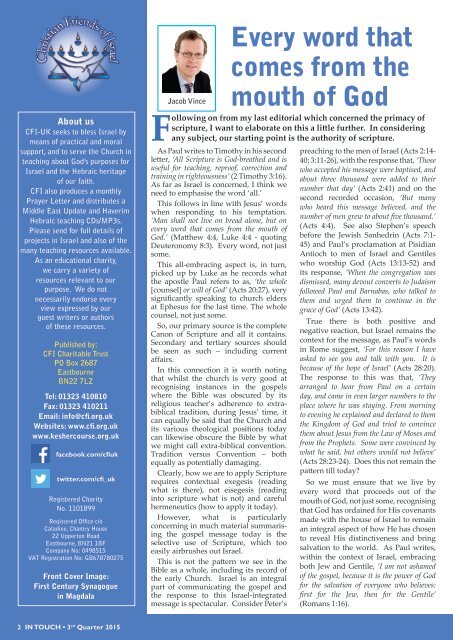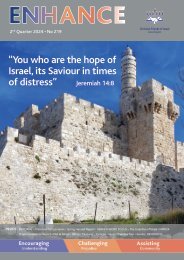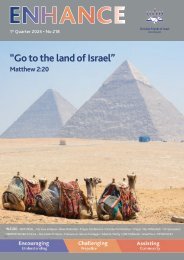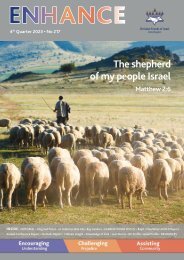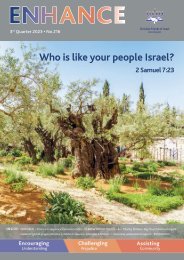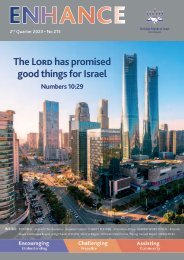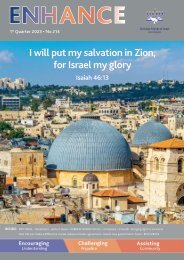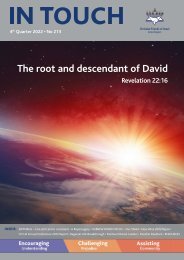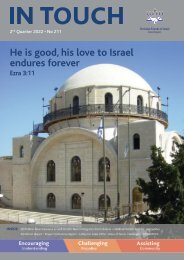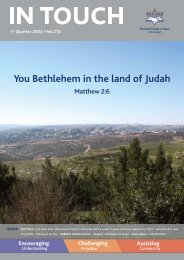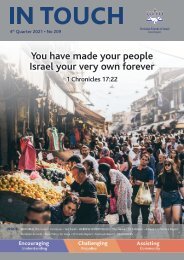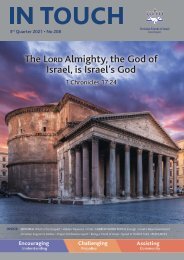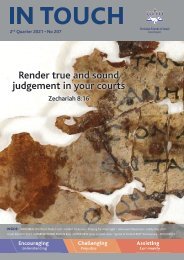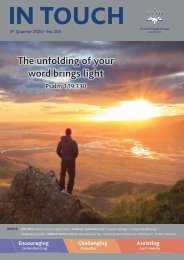About usCFI-UK seeks to bless Israel bymeans of practical and moralsupport, and to serve the Church inteaching about God’s purposes forIsrael and the Hebraic heritageof our faith.CFI also produces a monthlyPrayer Letter and distributes aMiddle East Update and HaverimHebraic teaching CDs/MP3s.Please send for full details ofprojects in Israel and also of themany teaching resources available.As an educational charity,we carry a variety ofresources relevant to ourpurpose. We do notnecessarily endorse everyview expressed by ourguest writers or authorsof these resources.Published by:CFI Charitable TrustPO Box 2687EastbourneBN22 7LZTel: 01323 410810Fax: 01323 410211Email: info@cfi.org.ukWebsites: www.cfi.org.ukwww.keshercourse.org.ukfacebook.com/cfiuktwitter.com/cfi_ukRegistered CharityNo. 1101899Registered Office c/oCaladine, Chantry House22 Upperton RoadEastbourne, BN21 1BFCompany No: 0498515VAT Registration No: GB678780275Front Cover Image:First Century Synagoguein MagdalaJacob VinceEvery word thatcomes from themouth of GodFollowing on from my last editorial which concerned the primacy ofscripture, I want to elaborate on this a little further. <strong>In</strong> consideringany subject, our starting point is the authority of scripture.As Paul writes to Timothy in his secondletter, ‘All Scripture is God-breathed and isuseful for teaching, reproof, correction andtraining in righteousness’ (2 Timothy 3:16).As far as Israel is concerned, I think weneed to emphasise the word ‘all.’This follows in line with Jesus’ wordswhen responding to his temptation.‘Man shall not live on bread alone, but onevery word that comes from the mouth ofGod.’ (Matthew 4:4, Luke 4:4 - quotingDeuteronomy 8:3). Every word, not justsome.This all-embracing aspect is, in turn,picked up by Luke as he records whatthe apostle Paul refers to as, ‘the whole[counsel] or will of God’ (Acts 20:27), verysignificantly speaking to church eldersat Ephesus for the last time. The wholecounsel, not just some.So, our primary source is the completeCanon of Scripture and all it contains.Secondary and tertiary sources shouldbe seen as such – including currentaffairs.<strong>In</strong> this connection it is worth notingthat whilst the church is very good atrecognising instances in the gospelswhere the Bible was obscured by itsreligious teacher’s adherence to extrabiblicaltradition, during Jesus’ time, itcan equally be said that the Church andits various theological positions todaycan likewise obscure the Bible by whatwe might call extra-biblical convention.Tradition versus Convention – bothequally as potentially damaging.Clearly, how we are to apply Scripturerequires contextual exegesis (readingwhat is there), not eisegesis (readinginto scripture what is not) and carefulhermeneutics (how to apply it today).However, what is particularlyconcerning in much material summarisingthe gospel message today is theselective use of Scripture, which tooeasily airbrushes out Israel.This is not the pattern we see in theBible as a whole, including its record ofthe early Church. Israel is an integralpart of communicating the gospel andthe response to this Israel-integratedmessage is spectacular. Consider Peter’spreaching to the men of Israel (Acts 2:14-40; 3:11-26), with the response that, ‘Thosewho accepted his message were baptised, andabout three thousand were added to theirnumber that day’ (Acts 2:41) and on thesecond recorded occasion, ‘But manywho heard this message believed, and thenumber of men grew to about five thousand.’(Acts 4:4). See also Stephen’s speechbefore the Jewish Sanhedrin (Acts 7:1-45) and Paul’s proclamation at PisidianAntioch to men of Israel and Gentileswho worship God (Acts 13:13-52) andits response, ‘When the congregation wasdismissed, many devout converts to Judaismfollowed Paul and Barnabas, who talked tothem and urged them to continue in thegrace of God’ (Acts 13:42).True there is both positive andnegative reaction, but Israel remains thecontext for the message, as Paul’s wordsin Rome suggest, ‘For this reason I haveasked to see you and talk with you. It isbecause of the hope of Israel’ (Acts 28:20).The response to this was that, ‘Theyarranged to hear from Paul on a certainday, and came in even larger numbers to theplace where he was staying. From morningto evening he explained and declared to themthe Kingdom of God and tried to convincethem about Jesus from the Law of Moses andfrom the Prophets. Some were convinced bywhat he said, but others would not believe’(Acts 28:23-24). Does this not remain thepattern till today?So we must ensure that we live byevery word that proceeds out of themouth of God, not just some, recognisingthat God has ordained for His covenantsmade with the house of Israel to remainan integral aspect of how He has chosento reveal His distinctiveness and bringsalvation to the world. As Paul writes,within the context of Israel, embracingboth Jew and Gentile, ‘I am not ashamedof the gospel, because it is the power of Godfor the salvation of everyone who believes:first for the Jew, then for the Gentile’(Romans 1:16).2 IN TOUCH • 3 rd <strong>Quarter</strong> <strong>2015</strong>
Standing in His GloryA TRIBUTE TO LANCE LAMBERTExtracts from David Soakell’s Watching Over Zion weekly news,commentary and prayer email report.<strong>In</strong> the letter of Paul to the believersin Philippi, he sums up his desireto be literally “with the Lord.” <strong>In</strong>the same way that Moses had anintimate relationship where theLord would speak face to face withhim as man speaks with his friend(Exodus 33:11). Surely this is theheart’s cry of every believer!We may imagine that was the issuePaul faced as he wrote his letter to theearly church. He’d reached a point inhis life when he just wanted to go andbe with the Lord. He was tired of thetrials and longed for that city of restwhere he could be with his Lord whomhe loved so dearly. After all, he wasin prison as his letter is being written.I think Paul suffered from the samemixed emotions that many believersfeel in our day and time - indeed, hewas ready for Heaven, but very muchneeded on Earth. <strong>In</strong> some small waythis may depict the last couple of yearsof the dear man of God, often referredto as ‘a senior statesman of Israel’ – afavoured teacher of the Word – LanceLambert.It is nonetheless with deep sadnessin our hearts that we learnt that worldrenowned Bible teacher Lance Lambertpassed away in Jerusalem around 3:15Sunday afternoon, 10th May. He was84. What is our great loss is Heaven’sgainCFI-UK’s Chief Executive JacobVince writes, “I would like to express oursadness on behalf of CFI UK at the recenthome calling of Lance Lambert. Lance wasan early advisor, along with the late ColonelOrde Dobbie, over the period when CFI wasformed thirty years ago in late 1985, withDerek White as UK founder-director andRay and Sharon Sanders as CFI Jerusalemfounder-directors.“Lance conducted Prayer and Bibleweeks in Israel, regularly spoke at the CFIJerusalem and UK annual conference. Heauthored several books, many incorporatingthe theme of Israel. He had a greatappreciation for the Scriptures in theircompleteness as the whole counsel of God,was as much an orator as Bible teacherand inspirational in leading <strong>In</strong>tercessoryprayer. He had a full understanding ofIsrael as God’s servant nation and theChurch as the bride of Christ, respondingto the finished work of the Lord JesusChrist. We offer our condolences to Lance’ssister Teresa, brother-in-law Achim andniece Sophia in their loss, as well as thoseclosely involved with Lance’s household,remembering them in our prayers. Lance’sHoly Spirit inspired, Biblical teaching willendure in our hearts as we seek to followand serve Christ Jesus, mindful of all whohave gone before.”For Christian Friends of Israel inJerusalem, Lance Lambert was aguiding light since the day we wereformed. On the CFI Jerusalem websitethe Directors write, “For thirty years hecarved out quality time to meet with ourleaders and there were not a few times inwhich we met on a regular basis. Lance(and the late Derek Prince) were the keyAdvisors to CFI until their passing on tobe with the Lord. For us, we were not justanother ministry to add to his schedule,we were always welcome in his home. Hisadvice and counsel during our early dayswas such a blessing from the Lord.”The tribute later states, “Countlesspeople around the world have been hisstudents for years. We shared manymoments of laughter with the witty senseof humour which he carried and even sadtimes - he truly was there during the highsand lows of all of us at CFI.A close friend of Lance Lambert,David Dolan writes, “Lance’s fine lifewas not at all lived out in secret, but waspublicly shared for many decades withuntold thousands of people around theworld who were blessed and enriched byhis wisdom, biblical insights, sharp wit andequally sharp mind, eloquence, and manyother positive things.”Born in 1931, Lance grew up inRichmond, Surrey and he became aBeliever in the Lord at the young age oftwelve years old. <strong>In</strong> the early 1950’s heserved in the Royal Air Force in Egyptand later founded Halford HouseChristian Fellowship in Richmond,England. Being born of Jewish ancestry(his father and many members of hisfamily died in the Holocaust), Lancebecame an Israeli citizen in 1980 andfor many years lived in Jerusalem.On top of many other giftings, Lanceproduced a world-wide quarterlyaudio recording called the Middle EastUpdate, and wrote numerous booksincluding the classic –‘The Uniquenessof Israel’, and went on to workclosely with Hugh Kitson presentingDVD video productions including‘Jerusalem, the Covenant City.’Lance’s niece, Sophia, writes onbehalf of the family, “Dear Friends, Iwant to thank you from the bottom of myheart for all your faithful prayers for myUncle Lance since he became ill in Greeceat the end of September. Knowing you werepraying meant a lot to Uncle Lance andmy parents (Achim and Teresa) and I andwe know that the Lord heard them and isfaithful.”Mourning is a natural thing to doand for those of us who have loved andknown Lance throughout the years, wewill of course miss him and mourn hisdeparture. And yet at the same time,we can also praise God that we had theprivilege to come under his teaching,and for many who are involved in theministry with Israel - to be his friend.Without doubt, Lance will now haveheard the sweet words of the LordGod – “Well done, My good and faithfulservant.”CFI are joining with Prayer ForIsrael (PFI) at their annual conventionat the Coton Centre, Tamworth onSaturday 18th July <strong>2015</strong>, for a LanceLambert Memorial service from, 10am– 12:30pm with Tributes from JohnAngliss, South of Reading ChristianFellowship, Steven Briggs of Hatikvah,Gerald Gotzen, David Pawson, PaulSkaife representing Halford HouseChristian Fellowship in Richmondand Jacob Vince on behalf of CFIUK. For further details please email:pfi@prayer4i.org, or call 01952 604 207facebook.com/cfiuk twitter.com/cfi_uk 3 rd <strong>Quarter</strong> <strong>2015</strong> • IN TOUCH 3


